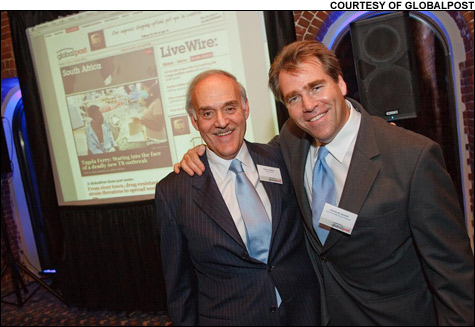
FOREIGN NEWSHOUNDS: In January, Philip Balboni and Charles Sennott will launch GlobalPost, a new Boston-based foreign-news-only service that will compete with the Associated Press and CNN. |
No other newsroom figure boasts quite the same mix of romantic appeal and nobility of purpose as the foreign correspondent. Hunkering down in exotic locales, courting and defying danger, watching history unfold, then writing its first draft for the folks back home . . . What could be more enticing?
Nowadays, though, dreaming of being a foreign correspondent is a bit like wanting to be a cowboy — or maybe a Betamax repairman. Newspapers are in trouble, period, but the future of foreign-news coverage looks especially dismal. In the mid '90s, for example, the Philadelphia Inquirer had six overseas bureaus; now it's got zero. The Baltimore Sun's former operations in Britain, China, London, Russia, and South Africa are all shuttered. And in 2007, the Boston Globe closed its remaining overseas operations, bringing reporters home from Jerusalem, Berlin, and Bogota. These cuts were possible, in large part, because of the continued existence of wire services like the Associated Press (AP). But now the same economic pressures that led papers to close their foreign bureaus are forcing many to sever their ties with the AP — leaving its long-term ability to cover the world in doubt too.
Factor in television news' decades-old drift toward a "parachute coverage" model — in which journalists drop in to cover big events, then head back home — and it seems that, with a few exceptions (e.g., the New York Times, the Washington Post, CNN, and National Public Radio), foreign reporting looks to be a dead end. And this is for the best, some contend. As Philadelphia Inquirer owner Brian Tierney said to Washington Post media columnist Howard Kurtz in 2006: "We don't need a Jerusalem bureau. What we need are more people in the South Jersey bureau."
Here in Boston, though, an ambitious push is underway to create a new model for overseas reporting — one which, in addition to giving Americans a sui generis take on the wider world, aims to make such work a winning financial proposition.
GlobalPost, the venture in question, doesn't officially launch until January 12, 2009 (and that's when its Web site, globalpost.com, will also debut), but there's already good reason to take it seriously. Philip Balboni, GlobalPost's president and CEO, has a proven knack for building from the ground up: he founded New England Cable News and successfully built it into the regional (and profitable) equivalent of CNN. In addition, GlobalPost's V-P and executive editor, Charles Sennott, has impeccable foreign-news credentials of his own: he ran the Globe's Middle East and Europe bureaus before they were shuttered, and also reported from Afghanistan. What's more, Amos Hostetter Jr., GlobalPost's lead investor, has a pretty solid track record: he founded Continental Cablevision and ranked 147 on this year's Forbes 400 list, with an estimated worth of $2.8 billion.
So far, so good. Now, GlobalPost just needs to show that its model actually works.